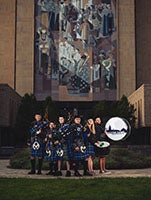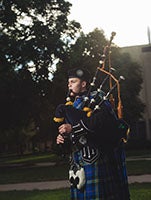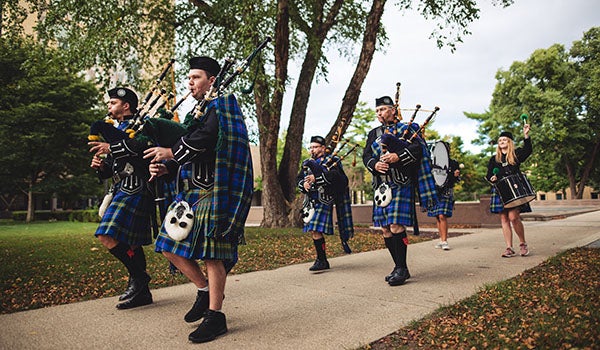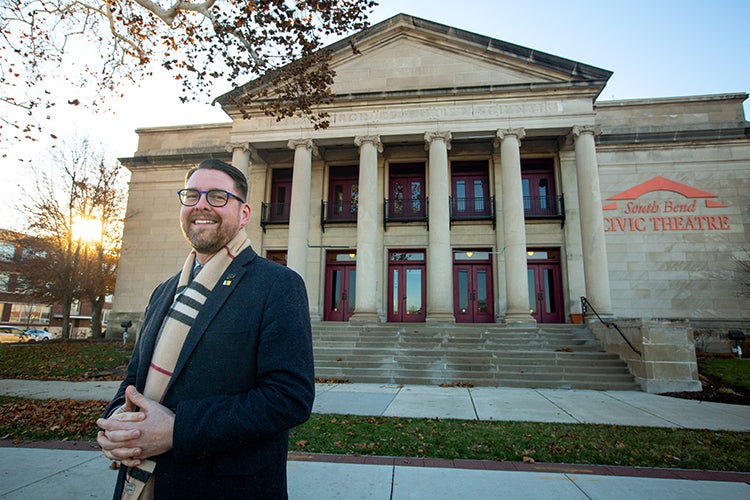It is a sound that stirs a plethora of feelings in people: delight, reverence, heritage, dread, frustration, the fighting spirit, courage, pride.
It’s a sound that carries, wholly distinct from everything else — the sound of the old country, the sound of the highlands, and the sound of plaid.
Generally, this is the sound of the bagpipes, but at Notre Dame University it’s the sound of tradition and a campus subculture that combines school spirit with Celtic legacy.
 Although it is not as old as the university itself, the Notre Dame bagpipe band has half a century of history as the pipers of the Fighting Irish. The band was first formed in 1949 as part of the university Irish Guard. Due to the often temperamental climate of the Midwest, bagpipe reeds did not play well on cold, damp game days, and the band disbanded in 1954.
Although it is not as old as the university itself, the Notre Dame bagpipe band has half a century of history as the pipers of the Fighting Irish. The band was first formed in 1949 as part of the university Irish Guard. Due to the often temperamental climate of the Midwest, bagpipe reeds did not play well on cold, damp game days, and the band disbanded in 1954.
The bagpipe band’s second iteration appeared in 1987 when a sophomore named Paul Harren started an independent bagpipe band, which survived by the passing of leadership and responsibilities, and of course a love for playing the peculiar wind instrument. The band gradually became an official student club, accumulated more gigs, fought for the right wear the Notre Dame tartan, and in 2011 was given the privilege of leading the football team to the field on game days.
The bagpipe band’s time and sound does not belong solely to football and sporadic gigs such as funerals and campus weddings, however. The pipers have spaces, like the half circles outside the Golden Dome on game days, that are uniquely theirs, where the pride of the Fighting Irish and the esthetic of the bagpipes come together for those who simply want to listen and witness.
The intersection of the esthetic space, school pride and love of the instrument and its history at Notre Dame is what has continued to draw students like Jack Harrington to the bagpipe band for the last few decades. Jack, a sophomore architecture student, has played bagpipes since he was 10 years old. In his second year of school, Jack is the pipe major for the band, responsible for selecting music for the season and recruiting other students, among other organizational and administrative duties.
“It’s been a great time because I love piping,” Jack says. “Because my family stopped playing, I found community with the band, with people who love playing the instrument.”
While Jack is a seasoned player, the 2019-2020 bagpipe band is an anomaly in recent years. With 17 members it is on the smaller side of bagpipe bands, and on the short end of students who actually play the bagpipes. The Notre Dame bagpipe band welcomes students who do not yet play the bagpipes but have an interest in learning the instrument and carrying on its legacy at the university.
Faculty and alumni are welcome to join the band for certain performances and appearances. Dr. Dominic Vachon is a longtime bagpiper who joined the band early in its revival in the 1980s and still performs as a regular member of the band. Occasionally, alumni join the band for tunes they know. The size and the openness of the group shape the subculture of the bagpipe band in an appealing and novel way, according to Jack.
“It’s a super inviting thing,” Jack says. “We’re integrated with the [marching band] and the community. It’s a way of fulfilling our love of music and piping while banding the community together around an idea.”
Jack says the bagpipes still get mixed reviews. As a freshman, Jack recalls a time when he was practicing outside on campus and an upperclassman politely but forwardly pointed out that there were students in neighboring buildings who were trying to study. But through the paradox of abrasive out-of-context piping and the social acceptance and reverence of piping before a game, and the culmination of Celtic heritage, school pride and music, the Notre Dame Bagpipe Band embodies a sacred space in university life.
It is the echo of inherited student legacy, the reverberation of traditions of older times, and the sound of the Fighting Irish.
“Part of what makes the Notre Dame brand special is the idea of the Fighting Irish,” Jack says. “We stick that brand into our culture really well, and what’s special in the eyes of the community at large is how well [the bagpipe band] fits into the culture of the university.” χ





